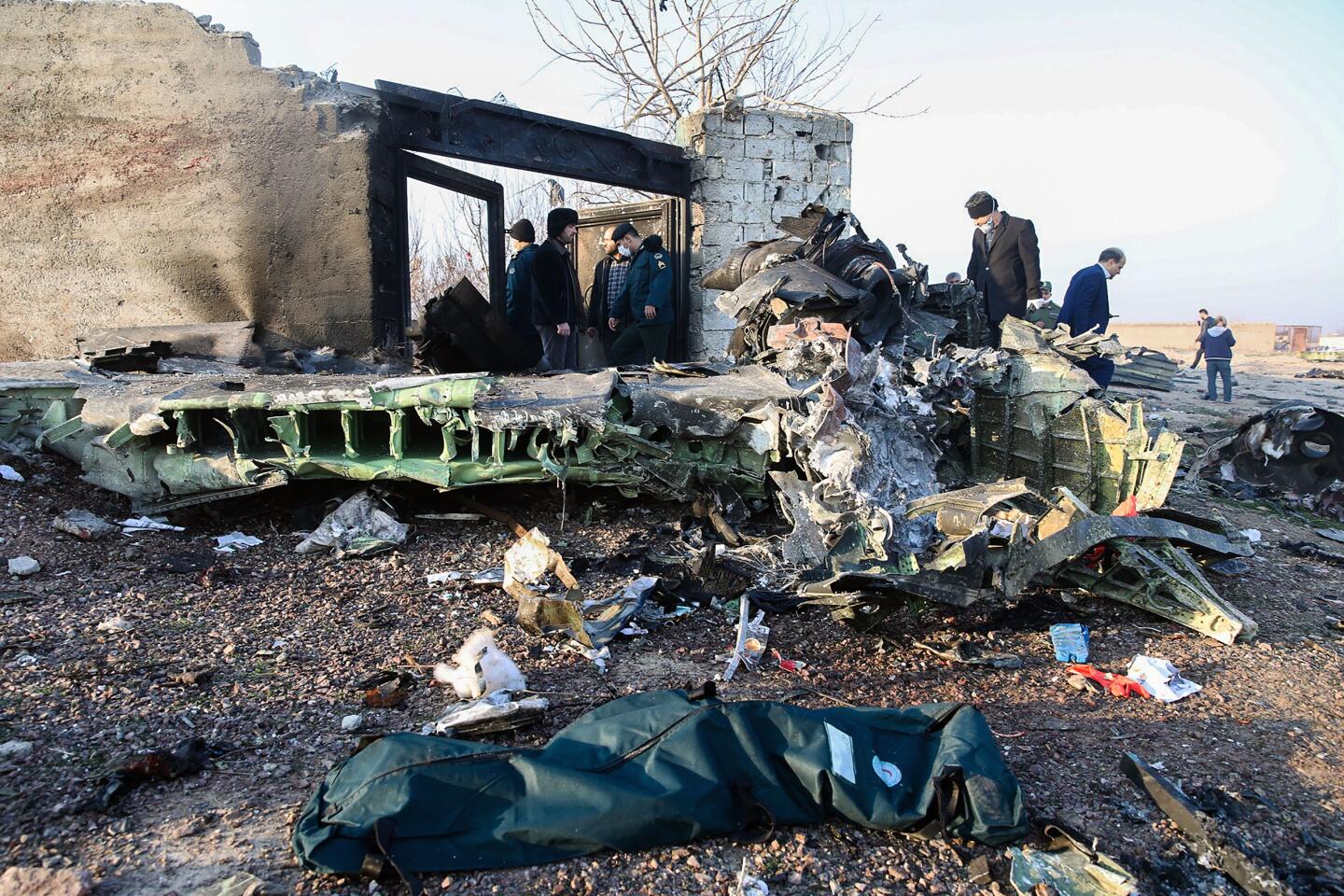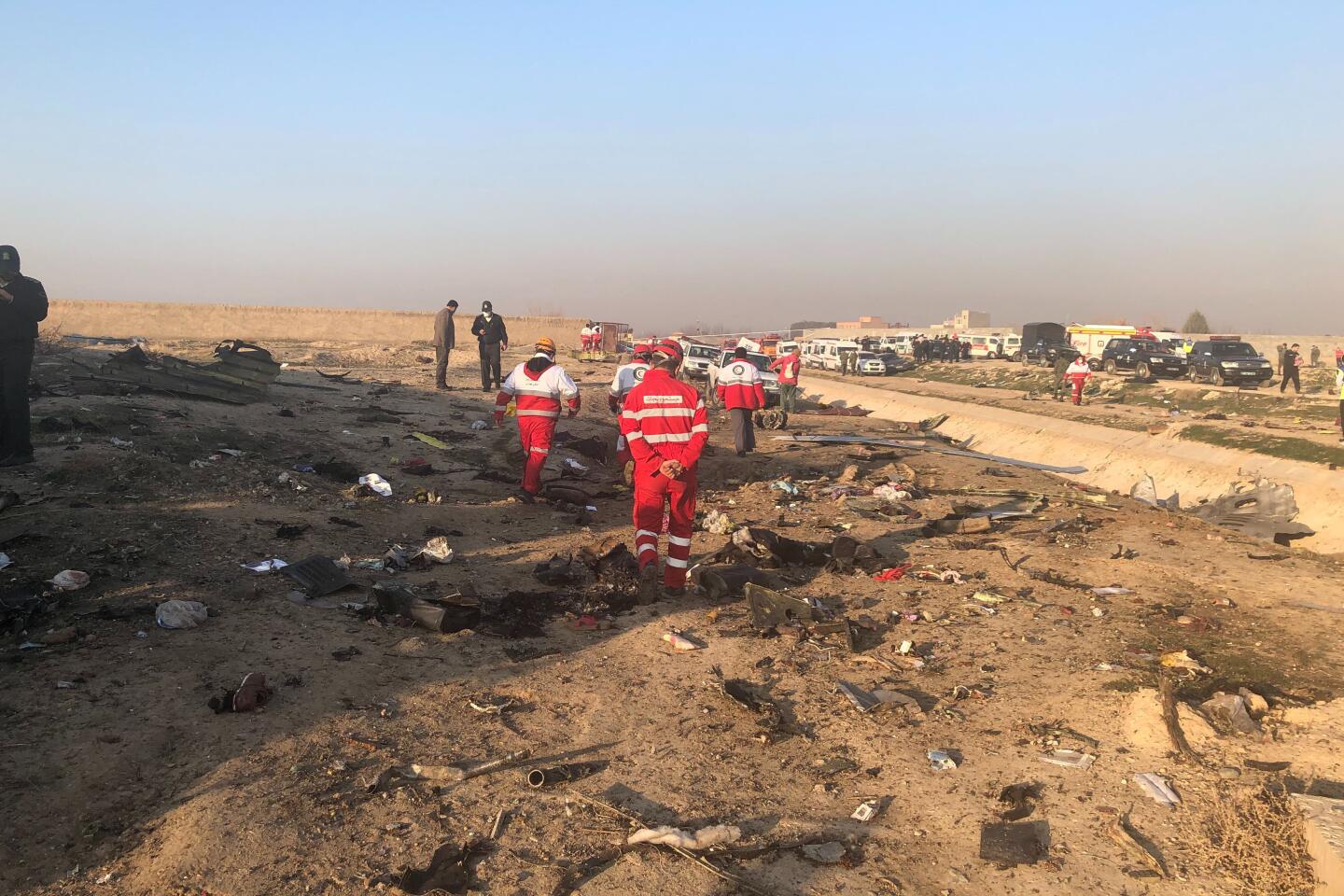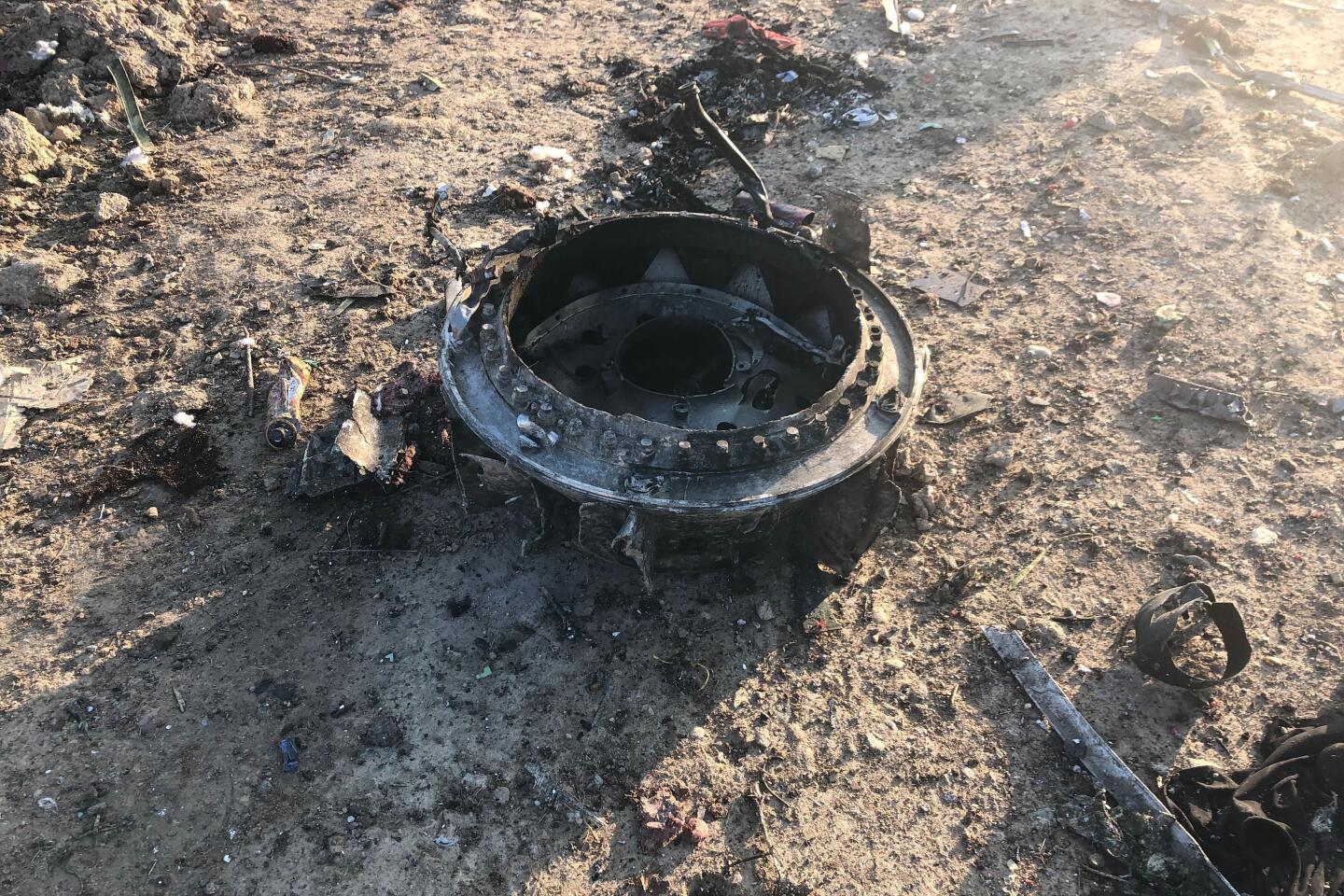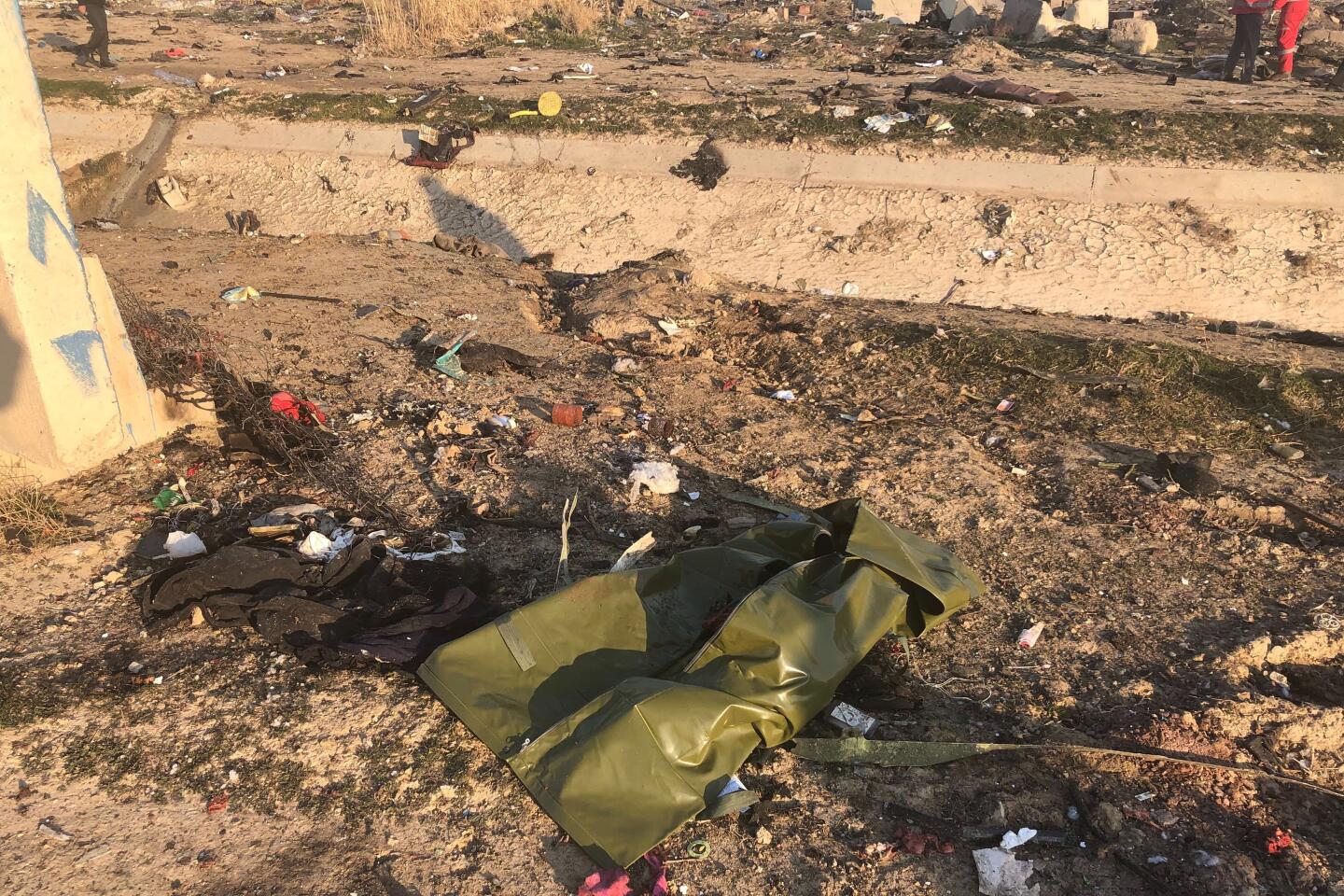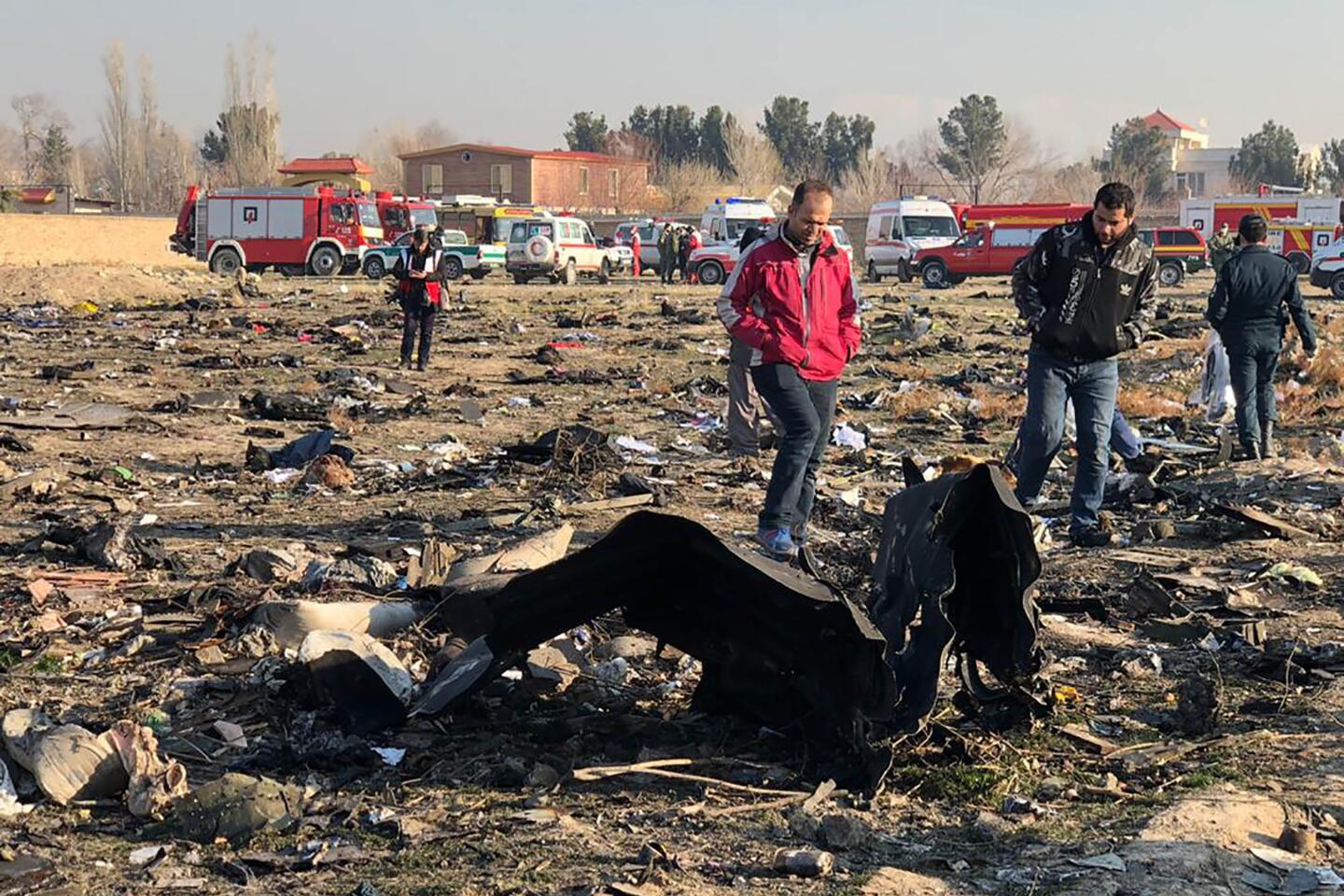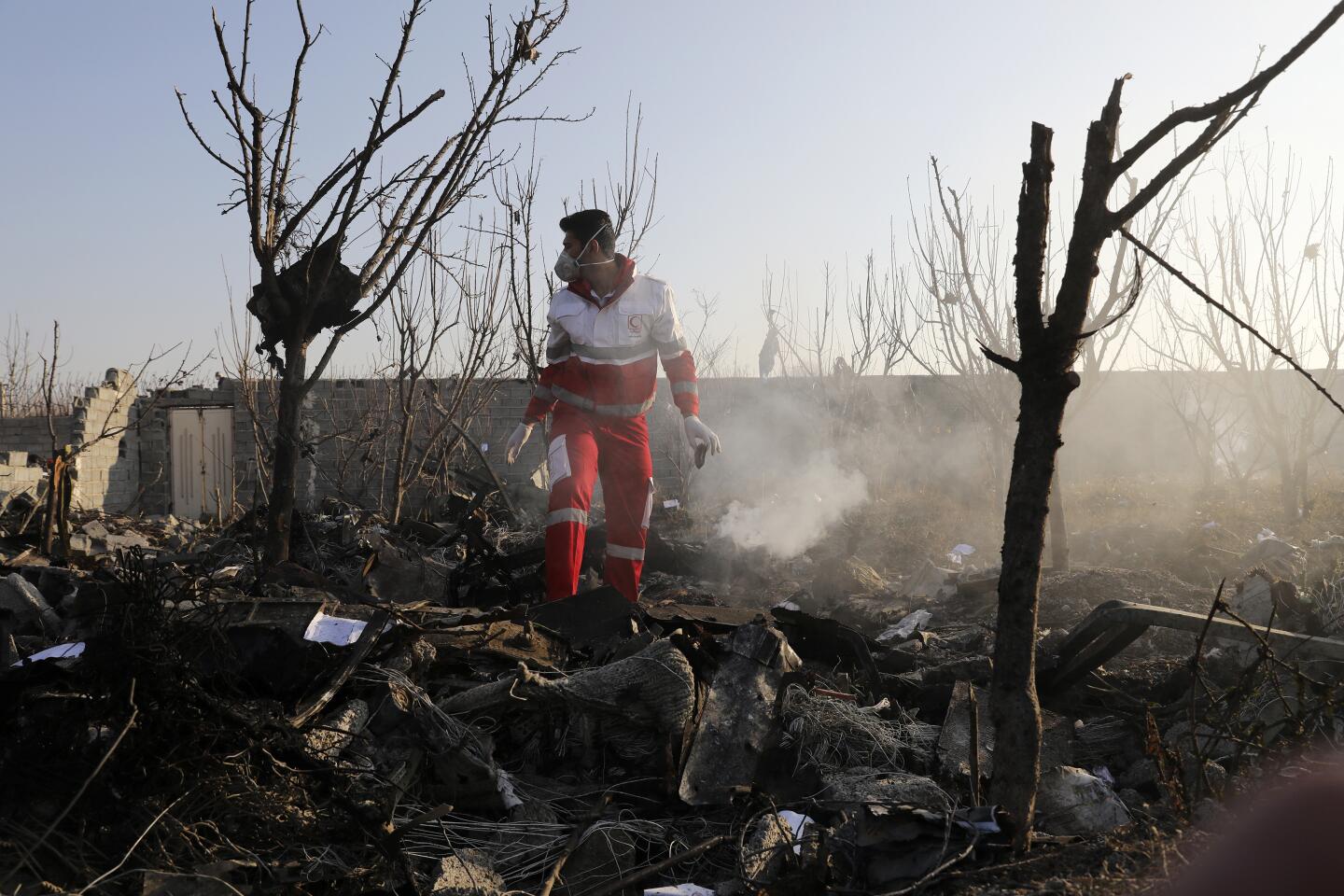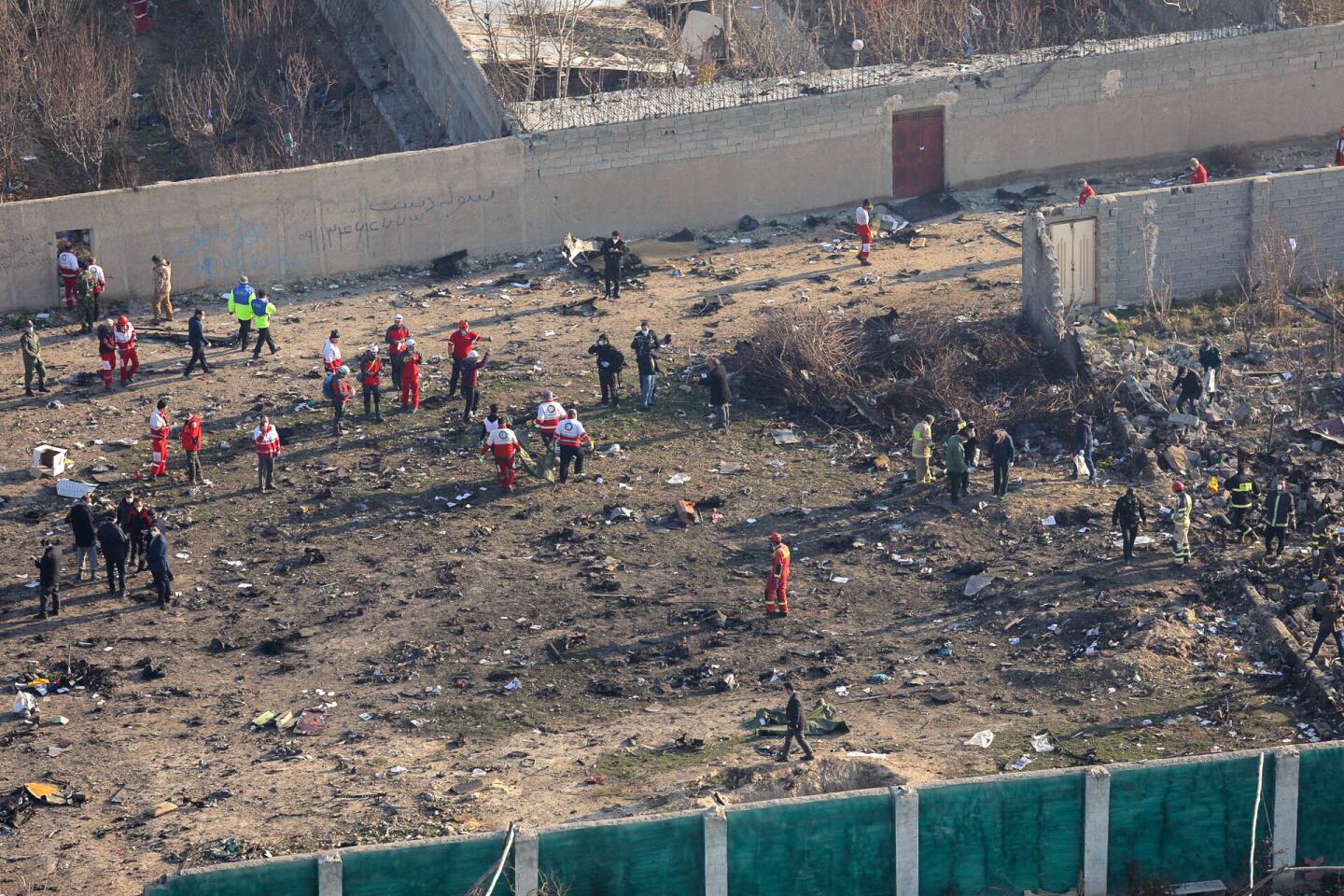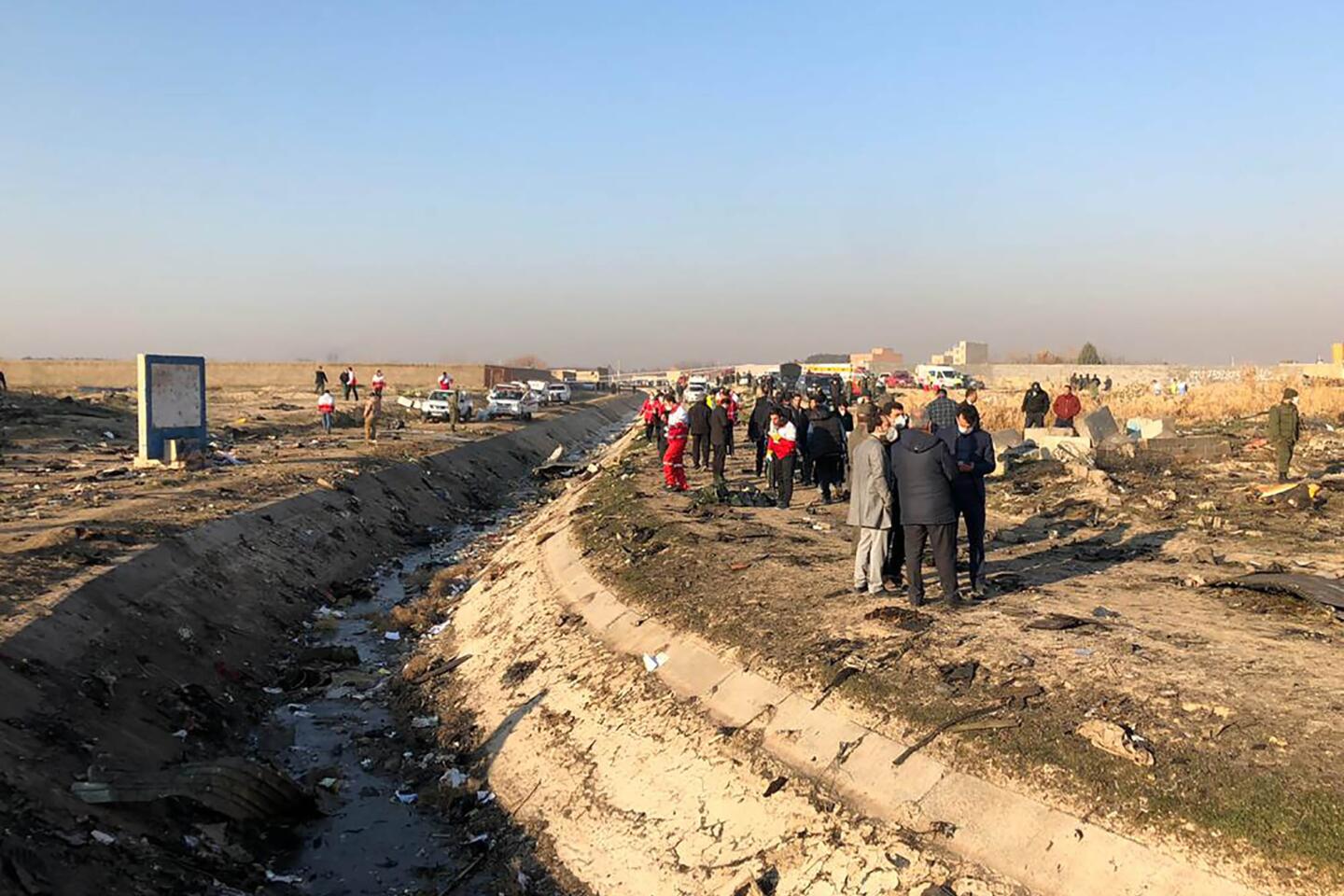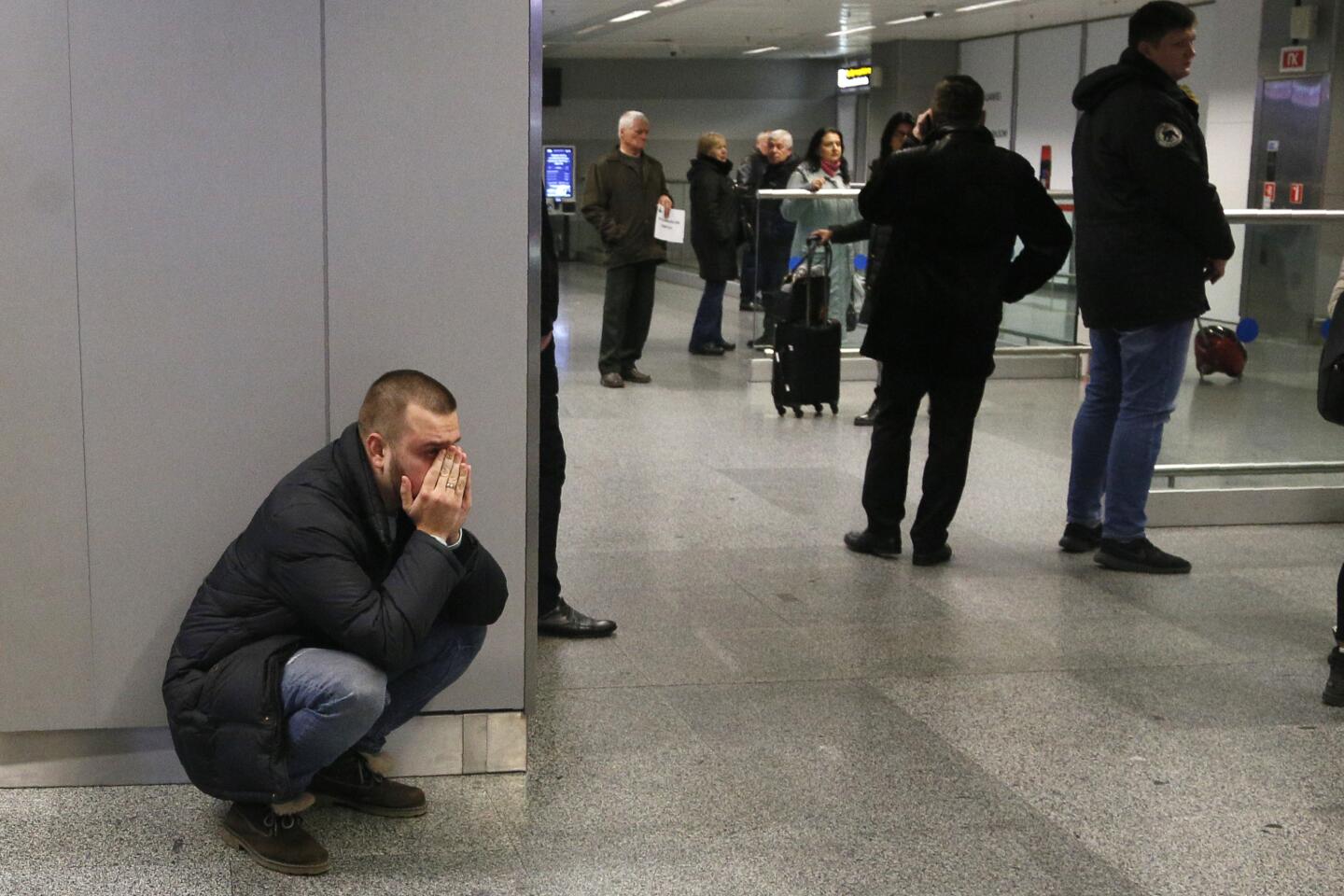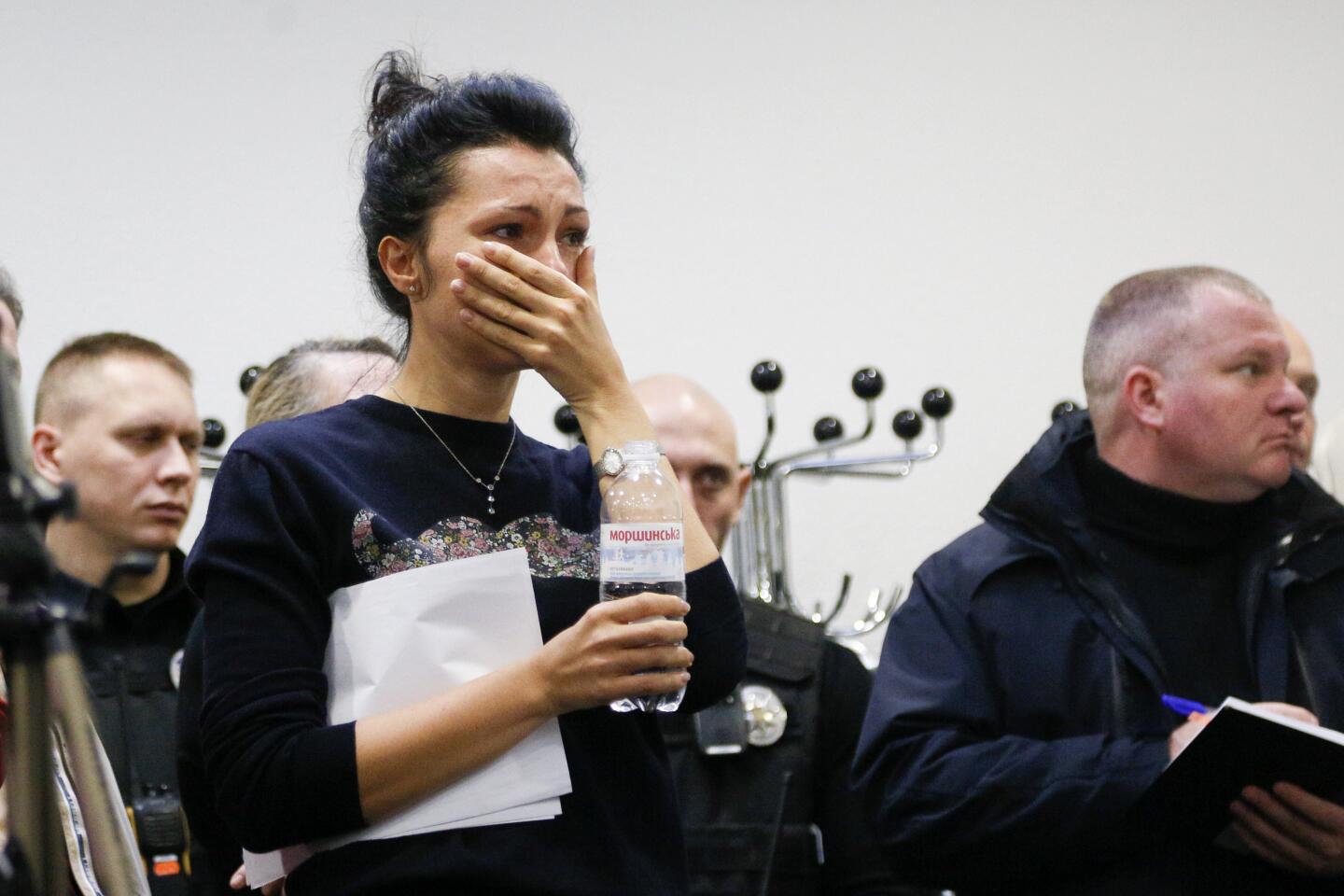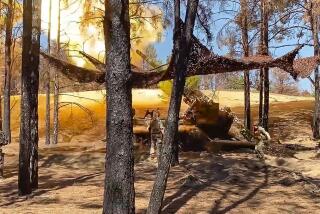Ukrainian airliner crashes near Iran’s capital, killing 176
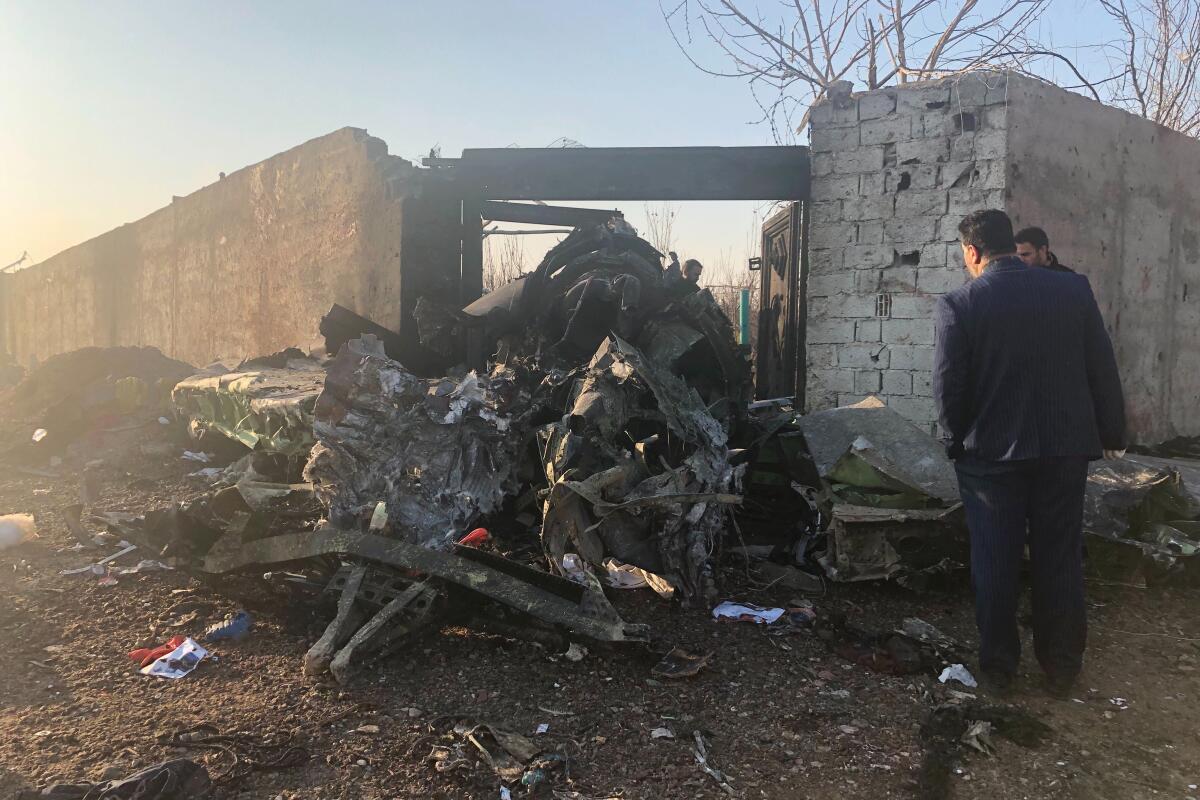
SHAHEDSHAHR, Iran — A Ukrainian airliner carrying 176 people crashed on the outskirts of Tehran during a takeoff attempt Wednesday, hours after Iran launched a missile attack on U.S. forces in Iraq. The crash scattered flaming debris and passengers’ belongings across farmland and killed everyone on board.
The Iranian military disputed any suggestion the plane had been hit by a missile, and Iranian aviation authorities said they suspected a mechanical problem brought down the 3½-year-old Boeing 737. Ukrainian officials initially agreed but later backed away and declined to offer a cause while the investigation was underway.
The plane had taken off from Imam Khomeini International Airport in the Iranian capital when a fire struck one of its engines, said Qassem Biniaz, a spokesman for Iran’s Road and Transportation Ministry. The pilot of the aircraft lost control of the plane, which then crashed into the ground, Biniaz said, according to the state-run IRNA news agency.
The Boeing 737-800 carried 167 passengers and nine crew members from different nations. Ukraine’s foreign minister, Vadym Prystaiko, said there were 82 Iranians, 63 Canadians and 11 Ukrainians on board — the Ukrainian nationals included two passengers and the nine crew. There were also 10 Swedish, four Afghan, three German and three British nationals.
Flight PS-752, operated by Ukrainian International Airlines, was a scheduled flight from Tehran to Kyiv, company officials confirmed.
Many of the passengers were believed to be Iranian Canadians or international students headed to Kyiv or, beyond that, to Toronto after visiting family during the winter break. The manifest included several teenagers and children, some as young as 1 or 2.
Ukrainian President Volodymyr Zelensky cut short a visit to Oman to return to Kyiv and said a team of Ukrainian experts would fly to Tehran to help investigate the crash.
“Horrible news from the Middle East,” Zelensky wrote on his Facebook page Wednesday morning. “My sincere condolences to the relatives and next of kin of all the passengers and crew.”
On his Telegram channel later Wednesday, Zelensky said he ordered the prosecutor general to launch an investigation into the crash.
“Our task is to establish the cause of the crash of the Boeing and provide all necessary help to the families of the victims,” said the Ukrainian parliament speaker, Dmytro Razumkov, in a Facebook statement.
In Canada, where the crash ranked among the worst losses of life for Canadians in an aviation disaster, Prime Minister Justin Trudeau said the country was “shocked and saddened,” and he vowed the government will work to “ensure that this crash is thoroughly investigated and that Canadians’ questions are answered.”
An investigation team was at the site of the crash on the southwestern outskirts of Tehran, civil aviation spokesman Reza Jafarzadeh said.
“After taking off from Imam Khomeini International Airport, it crashed between Parand and Shahriar,” Jafarzadeh said. “An investigation team from the national aviation department was dispatched to the location after the news was announced.”
Flight data from the airport showed a 737-800 flown by Ukraine International Airlines took off Wednesday morning, then stopped sending data almost immediately afterward, according to website FlightRadar24. The airline did not immediately respond to a request for comment.
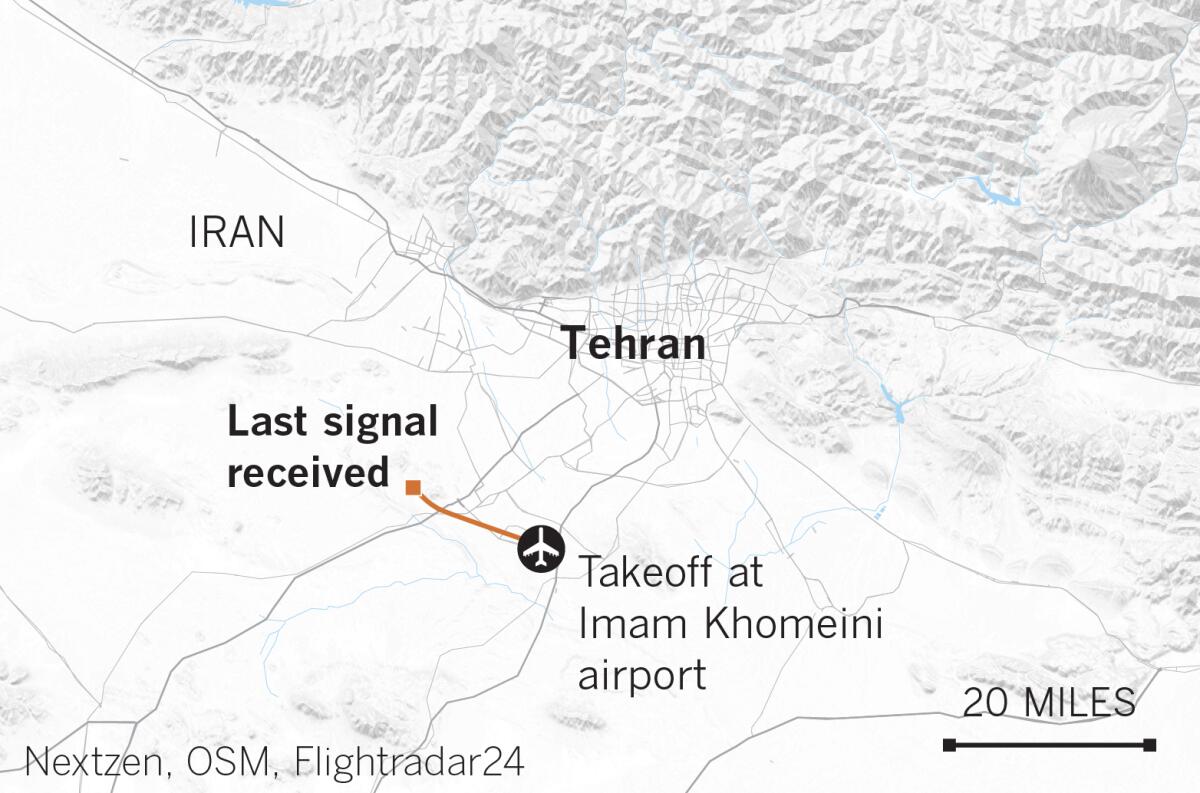
A photo later published by IRNA showed rescue officials in a farm field with what appeared to be pieces of the aircraft nearby.
In conditions of war, given the current tensions between Iran and the U.S., the plane could have been shot down by a missile, said Igor Romanenko, a senior Ukrainian military expert and former deputy chief of staff of the Ukrainian armed forces. A top defense expert, he was in charge of air force and anti-aircraft defense.
“Even if there was something wrong with one engine — and reportedly one engine was on fire — this plane could still fly with the good engine and attempt to gain altitude and return to land,” Romanenko said. “So it should have been most likely something else that made the plane crash.”
Romanenko said the surface-to-surface missiles Iran has launched would not normally be expected to be able to down the aircraft, but anything is possible given the plane’s altitude at the time of almost 8,000 feet. That would make it an ideal target for a handheld surface-to-air system, he said.
As an example, Romanenko recalled the crash of the Malaysian Airlines Flight 17 over the war-torn Donbass region of Ukraine on July 17, 2014. The plane was reportedly shot down with a Russian BUK missile.
Last year, Dutch prosecutors charged three Russian nationals associated with Russia-backed separatist forces in Ukraine and an alleged Ukrainian collaborator with the deaths of the 298 passengers and crew on board. Their trial is set for March 9. Investigators determined that the missile was launched from a vehicle belonging to a Russian anti-aircraft missile brigade.
Vadim Lukashevich, a Russian defense analyst, said in a phone interview that in some images provided by various media from the crash site, holes in the plane’s fuselage are clearly visible. He said they were concentrated in a specific pattern and density to suggest they could have been created by shrapnel from a close external explosion.
“The epicenter of the explosion must have been very close to the plane if that was a likely missile attack,” Lukashevich said.
The plane slammed into the ground near the town of Shahedshahr, sparking flames that lit up the darkened fields before dawn. The crash came hours after Iran launched a ballistic missile attack targeting two bases in Iraq housing U.S. forces in retaliation for the killing last week of Revolutionary Guard Gen. Qassem Suleimani.
Resident Din Mohammad Qassemi said he had been watching the news about the attack when he heard the crash.
“I heard a massive explosion and all the houses started to shake. There was fire everywhere,” he told the Associated Press. “At first I thought [the Americans] have hit here with missiles and went in the basement as a shelter. After a while, I went out and saw a plane has crashed over there. Body parts were lying around everywhere.”
The crash left a wide field of debris scattered across farmland, the dead lying among shattered pieces of the aircraft. Their possessions, including a child’s cartoon-covered electric toothbrush, a stuffed animal, luggage and electronics, were everywhere.
Rescuers in masks shouted over the noise of hovering helicopters. They quickly realized there would be no survivors.
“The only thing that the pilot managed to do was steer the plane toward a soccer field near here instead of a residential area back there,” witness Aref Geravand said. “It crashed near the field and in a water canal.”
The Boeing 737-800 is a very common single-aisle, twin-engine jetliner used for short- to medium-range flights. Thousands of the planes are used by airlines around the world.
The plane that crashed was acquired directly from Boeing in 2016 and was in excellent condition, airline officials said at a news briefing in Kyiv on Wednesday. They noted the aircraft’s most recent technical checkup was on Monday.
“This was one of our best planes with an excellent and reliable crew,” said Yevgeny Dykhne, president of Ukrainian International Airlines.
The company suspended flights to Iran indefinitely, Dykhne said. He refused to comment when asked whether the plane could have been shot down by a rocket.
“Given the information that the plane reached the altitude of 2,400 meters, the possibility of the crew’s mistake is minimal,” said Igor Sosnovsky, vice president of the company. “Given the experience of the crew it is very difficult to say that there could be anything wrong with them.”
Gen. Abolfazl Shekarchi, the spokesman for the Iranian armed forces, was quoted by the semiofficial Fars news agency as denying that the plane has been brought down by a missile.
“The rumors about the plane are completely false” he said. He said the rumors were “psychological warfare” by the Iranian government’s opponents.
Introduced in the late 1990s, the Boeing 737-800 is an older model than the Boeing 737 Max, which has been grounded for nearly 10 months after two deadly crashes. The 737 Max was billed by Boeing as quieter and more fuel efficient than the older 737 NG.
A number of 737-800 aircraft have been involved in deadly accidents over the years.
In March 2016, a FlyDubai 737-800 from Dubai in the United Arab Emirates crashed while trying to land at Rostov-on-Don, Russia, killing 62 on board. Another 737-800 flight from Dubai, operated by Air India Express, crashed in May 2010 while trying to land in Mangalore, India, killing more than 150 on board.
In November, the U.S. National Transportation Safety Board recommended that part of the plane’s engine be redesigned to prevent parts from coming loose. The NTSB’s recommendation came after a woman on a Southwest Airlines flight in 2018 was partially sucked out of the plane’s window and died. The NTSB found that a fan blade on an engine broke off and triggered the incident.
Chicago-based Boeing Co. was “aware of the media reports out of Iran and we are gathering more information,” spokesman Michael Friedman said.
Boeing, like other airline manufacturers, typically assists in crash investigations of its planes. However, that effort in this case could be affected by the U.S. sanctions against Iran since President Trump unilaterally withdrew from Tehran’s nuclear deal with world powers in May 2018.
Both Airbus and Boeing had been in line to sell billions of dollars of aircraft to Iran over the deal, which saw Tehran limit its enrichment of uranium in exchange for the lifting of economic sanctions. But Trump’s decision halted the sales.
Under decades of international sanctions, Iran’s commercial passenger aircraft fleet has aged, with air accidents occurring more frequently for domestic carriers in recent years, resulting in hundreds of casualties.
Times special correspondent Sergei Loiko in Kyiv, Ukraine, and Times staff writer Samantha Masunaga in Los Angeles contributed to this report.
More to Read
Sign up for Essential California
The most important California stories and recommendations in your inbox every morning.
You may occasionally receive promotional content from the Los Angeles Times.
